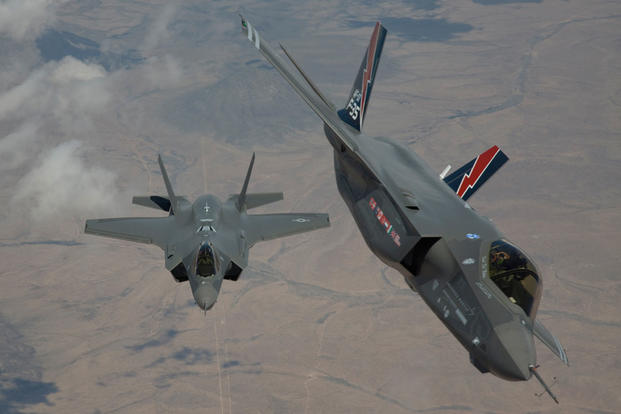Air Force Secretary Deborah Lee James has admitted to a wide range of past and present problems with the F-35 while maintaining that the fifth-general will eventually guarantee the U.S. continued air supremacy over rivals.
"The biggest lesson I have learned from the F-35 is never again should we be flying an aircraft while we're building it," James said at the Aspen Security Forum in Colorado last week.
In development stages, "People believed we could go faster, cheaper, better" by designing and building the F-35 concurrently, "and that the degree of concurrency would work. Indeed it has not worked as well as we had hoped and that's probably the understatement of the day," James said.
Related Video
"It has taken us too long, it has cost us way more money than we ever imagined possible," James said of the most expensive weapons program in Pentagon history. "We're very focused from now on to driving the cost down per unit and they are coming down."
However, she noted that there were additional challenges to making the Lockheed Martin F-35 Lightning II operational. "I would sum it up in one word – software," James said, noting the 24 million lines of code in the aircraft.
F-16 Dogfight
James also agreed that an F-35A "didn't do so well" in mock dogfights with an F-16 last January. The test pilot's assessment, first reported by the "War Is Boring" blog, said that the F-35 lacked the maneuverability to keep up with the F-16 and the F-35 pilot's helmet cut down on his vision.
"There were multiple occasions when the bandit (F-16) would've been visible but the helmet prevented getting in a position to see him," the report said.
James said the dogfight against the F-16 provided the F-35 program with valuable data but she also stressed that the F-35 will be a different plane when it's fully operational.
The F-35 then will have the capability to "see an enemy hundreds of miles in the distance," James said. "We get the first weapon off, we deliver the first punch and the bad guys don't know what hit them. The idea is not a close-in dogfight but with that said, by the time we're at full operational capability, we'll be much better in that arena as well."
At his Senate Armed Services Committee nomination hearing last week, Lt. Gen. Robert Neller, the choice to succeed Marine Gen. Joseph Dunford as the next Marine Commandant, said the Marine Corps was eagerly awaiting the arrival of the F-35s.
Neller praised "the electronics and all the information that this thing (the F-35) is going to be able to gather and eventually disseminate to the force on the ground. It's going to change how we do what we do. I'm an infantry guy. Planes are nice but they're really nice when they drop bombs and tell me what's on the other side of the hill."
On Monday, the head of Marine Corps aviation, Lt. Gen. Jon Davis, said that 10 F-35B versions of the aircraft had passed all tests recently conducted in Yuma, Ariz., and met all requirements for a declaration of combat readiness.
He said that Dunford was expected to make a decision soon on the IOC (Initial Operating Capability) of the F-35B, which is designed for short takeoff and vertical landing.
In a telephone news conference, Davis said the F-35s were "incredibly impressive" in targeting and providing close air support for ground troops.
-- Richard Sisk can be reached at richard.sisk@military.com




























